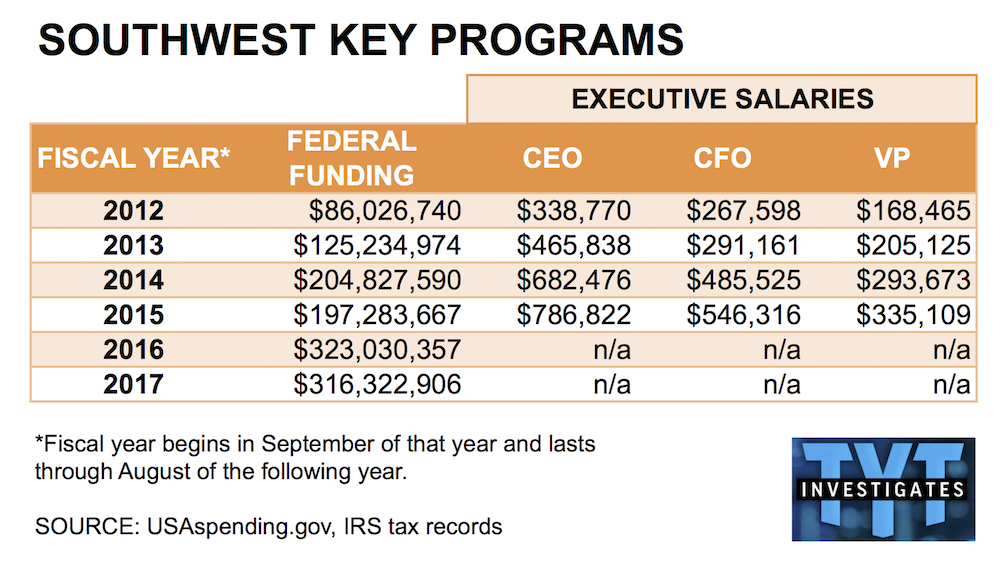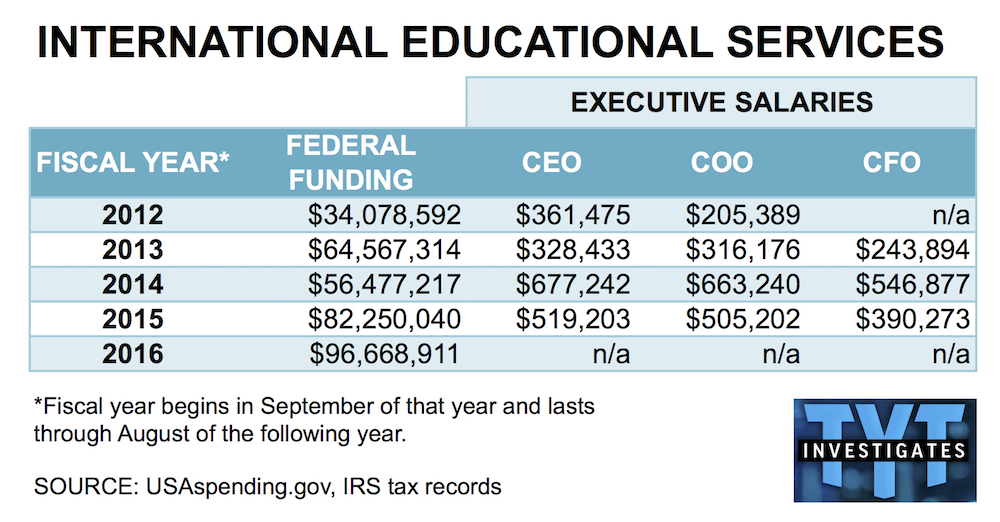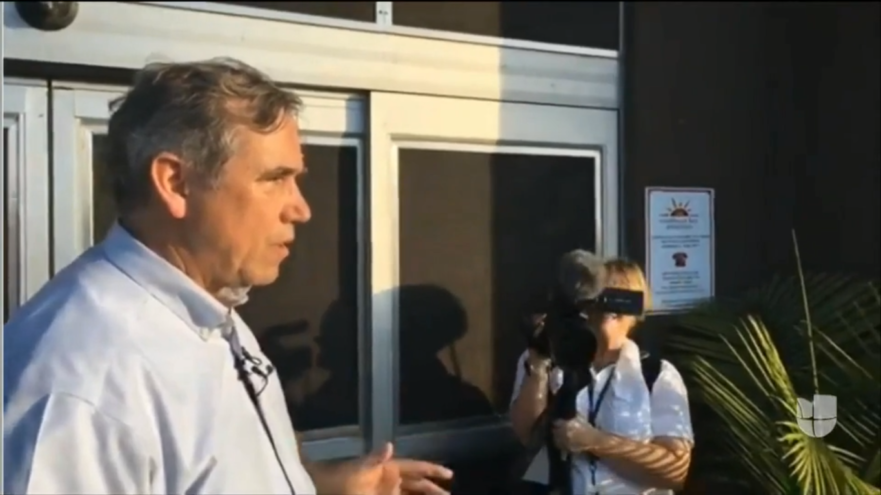Sen. Jeff Merkley (D-Ore.) unsuccessfully attempts to visit a shelter for undocumented children in Texas on June 3. (Image: Screenshot from Univision)
By Alex Kotch
Last week, Sen. Jeff Merkley (D-Ore.) visited an immigrant processing center and a detention shelter in southern Texas to see what the conditions were like for undocumented children held there. Merkley was able to inspect the McAllen, Texas, processing center. He wasn’t allowed to take pictures, but when he came out he said he saw young children behind fencing that resembled dog kennels, without mattresses and only foil blankets for comfort.
But it was the facility where Merkley wasn’t allowed to see anything at all where he really made headlines, raising concerns about how children are treated there and at other government-sponsored facilities.
That facility was the Casa Padre shelter in Brownsville, Texas, operated by the 501(c)(3) nonprofit organization Southwest Key Programs with funding from the U.S. Department of Health and Human Services (HHS). Case Padre houses roughly 1,000 children who arrived from Mexico unaccompanied or who were separated from their parents at the border. When Merkley tried to enter, shelter staff blocked him and called the police.
MUST WATCH: @SenJeffMerkley went to Brownsville, TX last night to visit immigrant children ripped from their families. He was denied entry and asked to leave the property. #FamiliesBelongTogether #KeepFamiliesTogether #wherearethechildren pic.twitter.com/DRW0E8qQxs
— CREDO Mobile (@CREDOMobile) June 4, 2018
Southwest Key in a statement later said that federal policy prohibits unapproved visits. But Merkley’s trip was just the latest story drawing attention to the government’s growing use of private contractors to process, house, transport, and place undocumented children. Many of the contractors are ostensibly non-profits, but tax records reviewed by TYT show that executives at some of them, including Southwest, have enjoyed massive pay raises at the same time their government contracts have skyrocketed. Some of them, including Southwest Key, are awarding pay hikes despite complaints about how they treat the children in their charge.
At Casa Padre, the facility that barred Merkley from entering, the Texas Department of Health and Human Services found 13 deficiencies and incidents during 22 inspections since late March 2017, according to a report in the Brownsville Herald. The state reports alleged failure to properly treat a child with an STI for over two weeks; a staff member belittling a child in front of others; and incomplete child records, including not listing contraindications to restraint.
TYT previously reported that some of the non-profits the government has contracted to transport and house unaccompanied children face lawsuits over alleged sexual harassment and race, sex and religious discrimination. One child died after being restrained at one of these shelters in 2001.
Southwest Key may be reticent regarding its facilities, but it isn’t shy about providing its executives with large, taxpayer-funded salaries, made possible by enormous government contracts and grants in recent years. According to tax records reviewed by TYT, President and CEO Juan Sanchez made nearly $800,000 in total compensation during Southwest’s fiscal year of 2015, which ranged from September 2015 through August 2016. Sanchez’s salary, and those of the two other highest-paid employees, saw big increases from FY 2012 to FY 2015. Sanchez’s annual pay more than doubled, from $339,000 to $787,000. Chief Financial Officer Melody Chung saw her compensation more than double, as well, from $268,000 to $546,000. And Vice President Alexia Rodriguez’s salary nearly doubled, rising from $168,000 to $335,000. Together, the three made close to $1.7 million in FY 2015.
Funding data reviewed by TYT show that these salary increases often correlated with increased government funding. Southwest Key took in $1.25 billion from FY 2012 (September 2012 through August 2013) to FY 2017, with revenue increasing in most years.
Tax records aren’t yet available for the 2016 or 2017 fiscal years, but government spending data are. And if the correlation between increasing salaries and government grants has continued, executives are making even more money now. From FY 2015 to FY 2016, HHS awards to Southwest Key increased to $323 million, a 64-percent increase, according to data from usaspending.gov. In May 2018 alone, the nonprofit received $107 million in HHS funding.

Southwest Key isn’t the only HHS-funded nonprofit that has rewarded top officials with big salaries. Texas-based International Educational Services (IES) had lucrative contracts with HHS until the agency ended them in November 2017, after Texas officials discovered dozens of deficiencies. Tax records show that from IES’s 2013 fiscal year to FY 2014, compensation for its three highest-paid executives more than doubled—from close to $890,000 to almost $1.9 million. In FY 2016, the nonprofit received $96.7 million in HHS funding, nearly triple the amount it received in FY 2012.

TYT called the IES’s Los Fresnos, Texas, main office. The person who answered the phone said that the organization had no one available to speak to the press.
Merkley said he was told he needed to give two weeks’ notice before visiting a government-funded detention center. It’s not clear not clear why any notice is required, but Merkley is introducing legislation that would allow members of Congress to visit child detention facilities with 24 hours’ notice.
The Oregon senator’s office issued a statement on June 4, saying, “President Trump and his administration are engaged in a cruel policy of inflicting trauma on children by ripping them out of the hands of their parents… By doing so with taxpayer dollars, they are making all Americans complicit in this unconscionable action. Americans have every right to full transparency about the cruelty being inflicted in our names.”
On June 7, Merkley sent a letter to the HHS Office of Refugee Resettlement that asked for details regarding the number of undocumented children separated from their parents and the conditions and standards of the detention facilities that hold them.
More members of Congress have begun to investigate the living conditions of undocumented people at government-funded detention centers. Rep. Primala Jayapal (D-Wa.) visited a federal prison in SeaTac, Washington, which houses nearly 200 women, many of whom were forcibly separated from their children by the Department of Homeland Security (DHS). The prison recently began accepting Immigration and Customs Enforcement (ICE) detainees. Jayapal said that the women she met with had previously been held in Border Patrol facilities that they called “dog pounds” because of the fenced cages used to detain them.
What I heard from the women being held at the federal detention facility today was saddening and disturbing. They cried so much.
Every asylum-seeker should be immediately released, reunited with their children and connected to legal services. Anything less is cruel and barbaric. pic.twitter.com/29dZrCX3Ug
— Rep. Pramila Jayapal (@RepJayapal) June 9, 2018
Southwest Key, Sen. Merkley’s office, and HHS’s Administration for Children and Families, which runs the Office of Refugee Resettlement, did not respond to requests for comment.
Alex Kotch is an award-winning investigative reporter whose work has appeared in The Nation, Vice.com, and International Business Times. Follow him on Twitter.
Follow TYT Investigates on Twitter, Facebook, and YouTube to stay on top of exclusive news stories from The Young Turks.


Comments
This is a great report! I especially liked the data on executive salaries. It would be interesting to see these same data on non-executive, front line people who work directly with the residents. Man, we really need a site that consolidates data like these for easy reference for people who are out campaigning for progressive candidates. That would give them the ammo (and I really do consider these data ammunition) for presenting the platforms of their candidates and to help them fortify their arguments against people on the right.